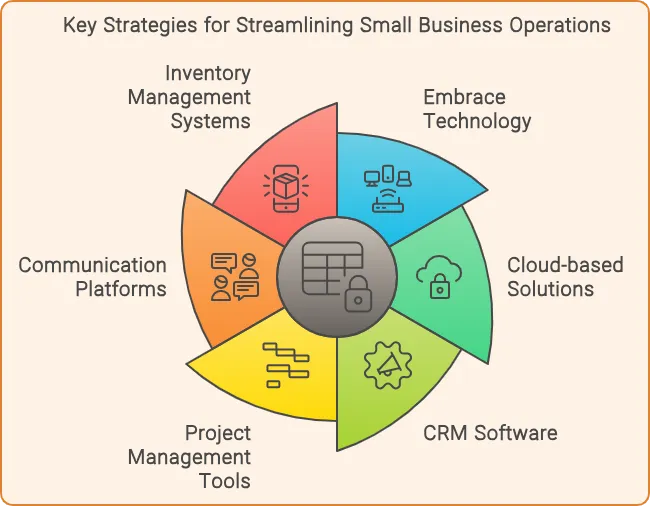
Efficiency Unleashed: 5 Key Strategies to Streamline Your Small Business Operations
Efficiency Unleashed: 5 Key Strategies to Streamline Your Small Business Operations
Running a small business is a thrilling adventure, but it's no secret that it can also be a juggling act. From managing finances and marketing to overseeing operations and customer service, small business owners wear many hats. Amidst this whirlwind, streamlining operations becomes crucial for maximizing productivity, reducing costs, and achieving sustainable growth. In this blog post, we'll delve into five key strategies that can empower you to unlock efficiency and propel your small business toward success.

1. Embrace the Power of Technology
In today's digital age, technology is a game-changer for small businesses. Embracing the right tools can automate tasks, streamline workflows, and improve overall efficiency. Consider implementing:
Cloud-based solutions: Store and access data securely from anywhere, facilitating collaboration and remote work.
Customer Relationship Management (CRM) software: Manage customer interactions, track leads, and nurture relationships effectively.
Project management tools: Organize tasks, assign responsibilities, and track progress to ensure projects stay on track.
Communication and collaboration platforms: Enhance communication and teamwork, whether your team is in-office or distributed.
Inventory management systems: Track stock levels, automate reordering, and avoid stockouts or overstocking.
Remember, technology should be an enabler, not a burden. Choose tools that align with your business needs and are user-friendly for your team.
2. Optimize Your Processes
Take a close look at your existing business processes and identify areas for improvement. Are there any bottlenecks or redundancies that can be eliminated? Can certain tasks be automated or delegated? Consider implementing these process optimization techniques:
Process mapping: Visualize your workflows to identify inefficiencies and opportunities for improvement.
Lean principles: Eliminate waste and focus on value-adding activities.
Standardization: Create clear procedures for recurring tasks to ensure consistency and reduce errors.
Delegation: Empower your team by delegating tasks that match their skills and expertise.
By streamlining your processes, you can free up time, reduce errors, and improve overall productivity.
3. Foster a Culture of Continuous Improvement
Efficiency isn't a one-time achievement; it's an ongoing pursuit. Encourage a culture of continuous improvement within your organization by:
Regularly seeking feedback: Ask your employees for their insights on how processes can be improved.
Encouraging innovation: Create an environment where employees feel comfortable sharing new ideas and experimenting with new approaches.
Investing in training and development: Equip your team with the skills and knowledge they need to stay ahead of the curve.
Celebrating successes: Recognize and reward employees who contribute to improving efficiency.

By fostering a culture of continuous improvement, you'll create a dynamic and adaptable organization that's always striving for excellence.
4. Prioritize Effective Communication
Clear and open communication is vital for streamlined operations. Ensure everyone in your team is on the same page by:
Establishing clear communication channels: Utilize tools like email, instant messaging, and project management platforms to facilitate communication.
Holding regular meetings: Schedule team meetings to discuss progress, address challenges, and brainstorm ideas.
Encouraging transparency: Share information openly and honestly to build trust and foster collaboration.
Actively listening: Pay attention to your team's feedback and concerns.
When everyone is informed and aligned, it minimizes misunderstandings, prevents errors, and boosts overall efficiency.
5. Outsource Strategically
As a small business owner, you don't have to do everything yourself. Consider outsourcing non-core tasks to experts who can handle them more efficiently. This can free up your time to focus on your core competencies and strategic initiatives. Some tasks that are often outsourced include:
Accounting and bookkeeping: Let professionals manage your finances, ensuring accuracy and compliance.
Marketing and social media: Leverage the expertise of marketers to reach your target audience effectively.
IT support: Rely on IT specialists to manage your technology infrastructure and troubleshoot issues.
Customer service: Outsource customer support to ensure timely and professional responses to inquiries.
By strategically outsourcing, you can tap into specialized skills, reduce overhead costs, and streamline your operations.
Conclusion
Streamlining your small business operations is a journey, not a destination. By embracing technology, optimizing processes, fostering a culture of continuous improvement, prioritizing communication, and outsourcing strategically, you can unlock efficiency, boost productivity, and position your business for long-term success. Remember, even small improvements can have a significant impact over time. So start implementing these strategies today and watch your business thrive.



Facebook
LinkedIn
Youtube
TikTok